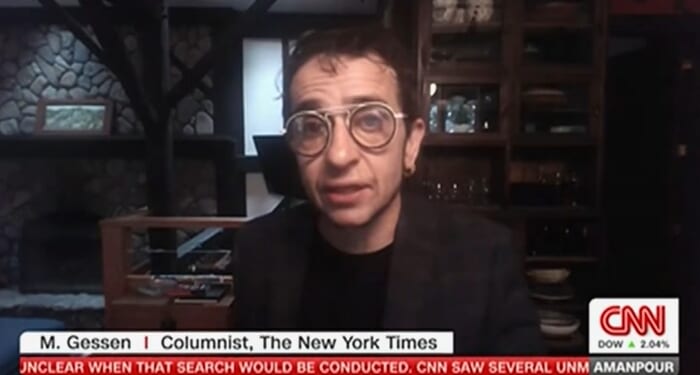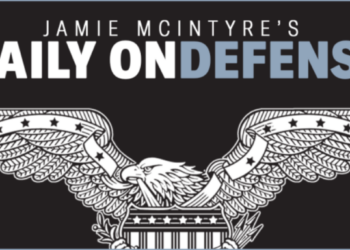The New York Times ran a repellent interview in its opinion section Friday, “We Need to Rethink How We Think About the Holocaust — Professor Marianne Hirsch on how the way we teach the ‘crime of all crimes’ informs our understanding of Gaza.”
By “rethink,” the paper means downplay the Holocaust and to lie about the war in Gaza as a “genocide.”
Hirsch of Columbia University was interviewed by Times columnist M. Gessen, formerly Masha Gessen, who now goes by “they.” Can one even imagine the New York Times in a previous era complaining about the “outsize influence of the Holocaust” and weaponing the Holocaust against its Jewish victims?
M. Gessen: Throughout the war in Gaza, Israeli leaders and their supporters in the United States have invoked the Holocaust to justify their actions….Some scholars of the Holocaust — people who have spent their professional lives keeping the memory of the catastrophe alive — are worried. They worry that their work has been repurposed as war propaganda and as justification for committing a genocide….There is a very strongly articulated position that the Holocaust should never be compared to anything….
Hirsch: …. And there’s an outsize influence of the Holocaust that then obscures other histories and also obscures what is happening right now: the genocide in Gaza, which the exceptionalism of the Holocaust has fostered denial of other genocides….
To further smear Israel, Hirsch misled about the Nakba of 1948, when Britain partitioned the Palestinian Mandate, cleaving out a Jewish state and an Arab state, with the Jews accepting statehood but the Arabs refusing to live alongside the Jews in the region. Several Arab countries then launched a failed war on Israel to strangle the Jewish homeland in its crib. As in Gaza, when Israel-haters start losing a war that they started, they blame the Jews.
Hirsch: ….one historical phenomenon that is part of the Holocaust is actually the formation of the state of Israel and the Nakba — the expulsion of Palestinians. So I think when we teach the Holocaust now, that has to be somehow part of the history. Our interrelation of Holocaust memory and Nakba memory really has to be taken into account.
The professor told Gessen why she felt compelled to drop her course at Columbia University because Jewish students had the false sense of being victimized on campus. Never mind the constant harassment and threats against Jews at Columbia and other progressive hotbeds during the pro-Hamas rallies.
HIrsch…. the way universities — including my own, Columbia — have conceded that they are hotbeds of antisemitism, and that Jewish students are suffering, has fostered a sense of Jewish victimization. That feeling of victimization prevents us from making the kinds of connections I’ve just been talking about.
Hirsch praised Gessen for previously comparing Gaza to the Nazi’s Warsaw Ghetto for Jews: “You compared it to the Warsaw ghetto and wrote something that was so memorable and devastating: ‘The ghetto is being liquidated.’ How are you thinking about this now?”
Gessen responded by agreeing with her own words and then again redefining “genocide” so Israel could fit into the parameters (though it still didn’t).
Gessen: It’s still being liquidated….Reporters would insist that obviously Gaza wasn’t a ghetto, and obviously it wasn’t being liquidated. Those were fascinating conversations, because I realized just how little many of them actually knew. I think the most important thing they didn’t understand — and that we often fail to understand — is that genocide is a process. Lately, I’ve been reporting a series on international justice and war crimes, and I realized that, legally, one of the key distinctions between genocide and crimes against humanity is precisely this: Genocide is a process. Crimes against humanity occur when large numbers of people are killed — or when civilians are intentionally targeted, or when there’s blatant disregard for human life. But genocide is different: It unfolds over time. It begins with setting the conditions for mass killing — with propaganda, with creating a climate in which many people can be killed — and then with gradually eliminating the conditions for life itself.
So starvation is very much a part of this genocide….
The post-ceasefire figures prove there was no starvation in Gaza, and certainly no genocide, as the ratio of civilian deaths to combat deaths was 1.5-to-1, a tribute to the Israeli army. But don’t expect such facts to penetrate the sealed anti-Israel propaganda bubble of the New York Times, which is far more concerned about fake “Islamophobia” than the actual anti-Semitism of Holocaust diminishment demonstrated in this interview.
















